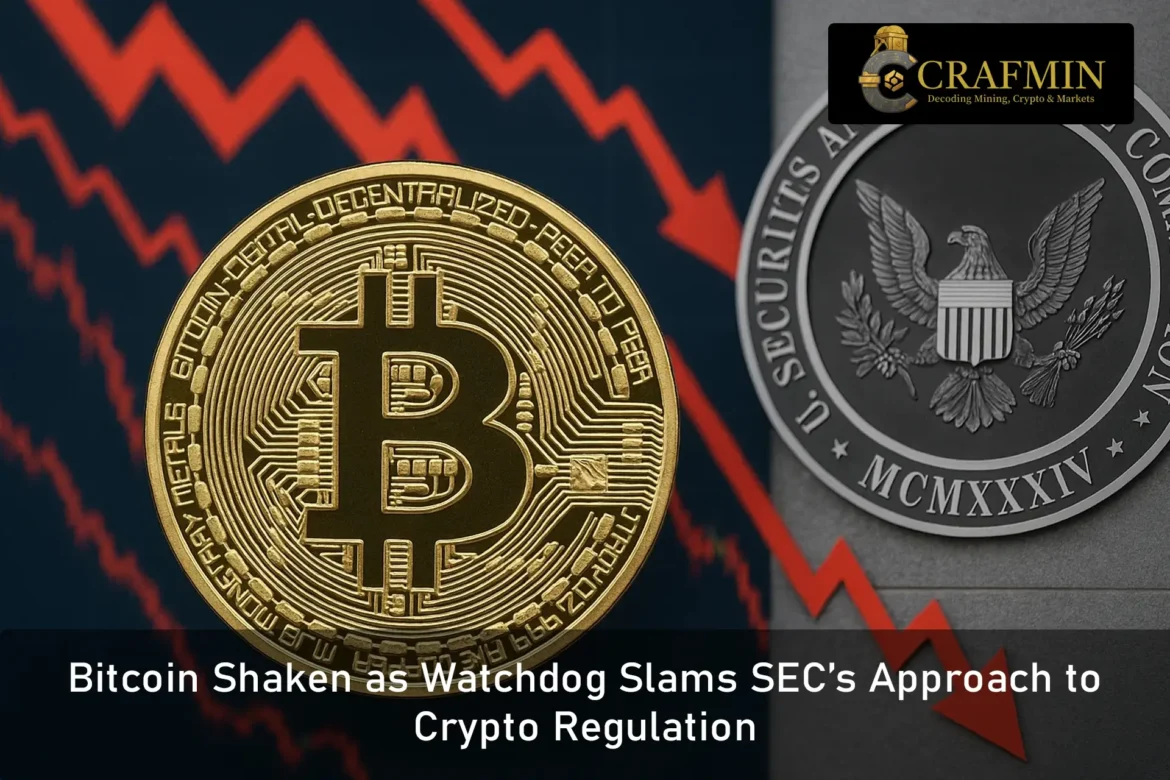A fresh wave of criticism has struck the U.S. Securities and Exchange Commission (SEC), with a federal watchdog raising significant doubts about the agency’s approach to regulating cryptocurrencies. The watchdog claims that the SEC’s tactics may be eroding public trust and damaging transparency in the digital asset space—adding fuel to already simmering tensions within the crypto community.
As Bitcoin and its counterparts continue to surge in relevance and adoption, this latest challenge may shape global policy discourse on how cryptocurrencies are governed.

Critics Challenge SEC’s Legitimacy in Overseeing Cryptocurrency Markets ( Image Source: Walk The Street Capital )
Transparency in Question: Enforcement Over Guidance
At the heart of the watchdog’s findings is a concern over the SEC’s regulatory methodology. While the agency insists its role is to protect investors and maintain fair markets, critics argue its heavy-handed enforcement strategy lacks the clarity needed for real compliance.
Instead of providing clear, proactive guidance for digital assets, the SEC is accused of favouring retroactive enforcement. This reliance on punitive action over policy development has sparked fears that the agency is blurring the lines between regulatory responsibility and overreach.
The result? A growing perception that crypto oversight is less about structure and more about selective punishment.
Industry Response: Compliance or Confusion?
The crypto sector’s reaction has been swift and strong. Founders, blockchain developers, and trading platforms say they are operating under murky rules. With the SEC often taking action without prior regulatory clarity, projects face the risk of penalties for standards that were never formally communicated.
“It feels like we’re playing a game where the rules are written mid-match,” one crypto strategist noted in a recent online forum.
This uncertainty is encouraging a wave of capital and talent migration. Jurisdictions like Switzerland, the UAE, and Singapore—known for more structured and predictable crypto regulations—are becoming attractive havens for crypto startups. For the U.S., this raises fears of losing its competitive edge in blockchain innovation.
Also Read: Historic Vote: U.S. Senate Moves Forward on GENIUS Act for Stablecoin Regulation
The SEC’s Defence: Policing a Fast-Moving Market
In its defence, the SEC argues that digital assets operate in a risky environment rife with fraud and volatility, requiring stringent oversight to protect retail investors. From this perspective, enforcement is not a flaw but a necessity.
However, the watchdog draws a crucial distinction: enforcement without structure leads to unpredictability, and unpredictability undermines public trust. Regulation, they argue, must be grounded in transparency—not built on ad hoc legal interpretations.
Without clear standards, enforcement actions risk becoming arbitrary and uneven, placing innovation in jeopardy.
Big shake-up! The SEC just hit the brakes on Biden-era crypto rules, including those pesky DeFi and asset custody regulations. Just when you thought they had a plan… or was it a *crypto* plan? #SEC #Crypto #DeFi #Bitcoin #Altcoin
Are we back to … https://t.co/esEsTRHrj0
— PM Cypher (@pm_cypher) June 13, 2025
Timing Matters: Global Crypto Markets Are Watching
The report lands at a time of heightened relevance. With institutional investment flowing into Bitcoin and Ethereum, and stablecoins edging closer to widespread adoption, clear and coherent regulation is more urgent than ever.
Globally, crypto-focused nations—Australia included—are paying close attention. Australia’s own digital asset strategy has leaned towards stakeholder engagement and legislative clarity. As such, the SEC’s enforcement-heavy model serves as a cautionary tale of how not to approach governance in an emerging industry.
The Broader Implication: A Question of Trust
At its core, this debate is about more than just policy. It’s about public confidence in the institutions that claim to guide innovation.
When an independent watchdog questions the legitimacy of a major regulatory body, it signals deeper fractures within the regulatory ecosystem. Since many governments model their crypto strategies on U.S. precedent, the impact of this criticism could be global.
For investors, developers, and users, these moments of scrutiny shape how they view the reliability of the financial and legal systems underpinning the crypto world.
What’s Next for the SEC—and Crypto Policy at Large?
The pressure is on for the SEC to shift gears. This could mean working more collaboratively with the crypto industry, issuing comprehensive guidance, or revisiting its enforcement-first approach.
The watchdog’s call is clear: build a system that doesn’t just punish non-compliance but fosters genuine understanding and participation. This approach is essential if digital assets are to grow within frameworks that promote both innovation and integrity.
In the absence of reform, the U.S. may find itself increasingly isolated as global crypto leadership moves to regions offering greater clarity and fairness.
Daily Crypto Analysis – June 13,2025
Regulatory Highlights
• The U.S. Senate plans to hold the final vote on the GENIUS Act on June 17th.
• The U.S. SEC has formally repealed the proposed extended Custody Rule, Rule 3b-16, and other regulations from the Gensler era.… pic.twitter.com/ZG7zQSiV3P— Okpay | Bird️ (@OkayPayBot) June 13, 2025
Conclusion: Oversight Must Inspire Confidence, Not Fear
The SEC remains central to how the financial landscape evolves. But that influence must be wielded wisely. The watchdog’s critique highlights the danger of enforcing without educating—of policing without policy.
As the digital asset world grows more sophisticated, the legitimacy of crypto oversight hinges on openness, balance, and clear governance. Without these, trust—the bedrock of any financial system—remains elusive.
The question now is simple: will the SEC listen?

